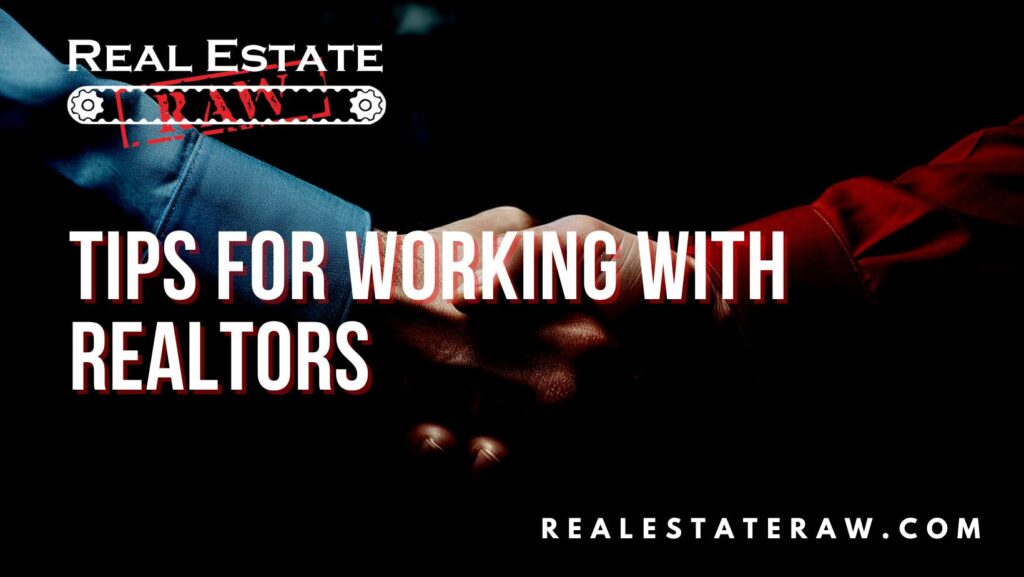I have been in the multifamily investing business for almost 20 years, and these are a few tips that I have discovered in my career. I have worked with hundreds of real estate agents, from single family realtors to commercial agents on very large transactions. These tips are for working with any agent in the real estate business.
Tip #1
Find out early in the initial conversation whether the agent you just called sells the asset type you are trying to buy. I cannot count how many times I called an agent who had an apartment listing but wasn’t a full-time commercial agent. Sometimes a single-family agent will get lucky and get a larger apartment complex listing. This is fine if you are interested in that specific property, but if you aren’t don’t waste much time building a relationship with them. They will not have access to the larger sellers in your area.
When I am on a call with a new realtor contact, I politely ask, “Are you are commercial agent?” You should do the same. If you want to buy something specific like self-storage or retail space, I suggest looking for a commercial agent that specializes in those property types.
Tip #2
When dealing with a realtor on a property you want to make a creative financing offer on, get permission! An agent must legally submit any offer you submit, but they do not have any obligation to recommend the offer to the seller. In fact, they can recommend the seller NOT take the offer.
The remedy for this is to start your sales pitch for creative financing to the agent first. Explain why this offer will solve everyone’s problems, why you are the person for the job, and how the realtor will get paid. You will likely need to explain how the creative offer will work. If you are offering a master lease, the agent may not know how that works. Spend some time explaining and educating this agent so they can do the same with the seller (who you may never get a chance to talk to directly). Once you have the agent on board with the offer, then submit it.
Tip #3
A good negotiation begins by allowing both sides to be a part of creating the agreement. It’s no different when working with an agent. Once you have explained why this offer is a good thing, you will want to get the agent involved in creating the offer.
Ask them for their guidance. Ask them what the seller really wants and explain that the two of you will create an offer that will help you all out. If you can get the agent involved in creating the offer, they will be much more likely to take the offer to the seller and recommend it.
Tip #4
The main objection you will get from a realtor about a creative financing offer is related to payment; they may not see how they will get paid. Keep in mind that the realtor’s main concern will be their commission on the sale. A listing agreement between an agent and a seller says the agent is due a % of the sales price. What if there is no real “sale” but instead an MLO or seller financing? What then? I can give you some tips, but the real answer is: you better get creative!
One thing you can do is to share the cash flow with the agent. Share as little as possible, just enough to get them interested. If you are doing a master lease option or seller financing, you can also write the agent into the contract. You will state in the contract that the agent is due XX amount of money or % of the cash flow each month and that they are due the full commission when you take title and pay off the seller. With an master lease option, that would be at the time you exercise your option to purchase. With seller financing, it would be when you execute your exit strategy. Explaining these details will help to make the agent more comfortable with helping you make the creative financing offer.
Tip #5
You also need to consider when and how to contact realty agents. I suggest limiting your email contact with them in the beginning. Never make your first contact with an agent through email. It’s too impersonal, and they can easily ignore you. Email is the quick and easy way to reach out to people, but it should only be used once the relationship is established. In the beginning, call them on the phone. If you don’t get an answer, leave a message, and call back in about a day if you don’t get a response.
You will want the opportunity to get this person’s attention quickly and definitively when you get them on the phone. An email doesn’t allow you to do that. And never send a 5-page email detailing what you want to say. No one will read it. Instead, you will want to showcase your knowledge about your market and real estate knowledge quickly over the phone. Once you have established a line of communication and the agent knows who you are, then it is perfectly fine to move to email as a form of communication.
When I am contacting agents, I have found that the best time to call them is Tuesday through Thursday from 9am to 5pm. On Mondays, people are catching up from the weekend and any work leftover from the last week. On Fridays, they are mostly thinking about the weekend. Tuesday through Thursday is the best time to catch them in their office and to find them in the best frame of mind.
Not all agents will be a good fit for you. If you call someone and they are rude or short with you, they may not be the best person to work with. If they do not respond to your requests for information or want to see that you have millions of dollars in a checking account before they work with you, move on! There are plenty of good agents who are hungry for business and will be more willing to work with you. Don’t let one bad conversation frustrate you. Just move on.
Tip #6
Be careful of an “exclusivity agreement.” Some agents will try to get you to sign an exclusivity agreement that will lock them in to being your representative whether they find a deal for you or not. Do not sign this! This is a totally one-sided agreement. This will allow them to take commission from any deal that you find in the area, even if they are not involved in the deal at all. This could also cause other realtors to not take your offers seriously, knowing they must give half of their commission to someone who did nothing to earn it.
In my opinion, it is okay to sign this agreement when it is specific to a deal the agent brought you. You should not attempt to cut an agent out of their commission if they brought you a deal, but the agreement ends there. If an agent tries to get you to sign an exclusivity agreement, then they are trying to lock you down with no risk on their part. If an agent tells me (and some have) that they will only show me properties if I sign this kind of agreement, I tell them that I will find someone else to find properties for me.
If they are good agents, they should be confident in their ability to find you good deals without locking you down. If they aren’t, then they are likely wasting your time anyway. If an agent asks you to sign this agreement and you want to have a little fun with them, say this, “I will sign your exclusivity agreement if you sign mine. I will be comfortable if you are my only agent in this market if I know I am the only investor you will represent in this market.” Funny, I have not had any agents take me up on this yet!
Tip #7
Again, realtors are most concerned with their commissions. Therefore, they may be especially concerned about an MLO. An MLO is not a sale, and the agent may be thinking that if they present your MLO offer and the owner accepts it, they will lose the listing and not be paid for their time.
Step one is to assure the agent that they will be paid if the MLO deal is accepted. This agent has brought you the deal and should be compensated. Make them happy and they will be a continuous source of good deals. Get cheap and it will cost you in the long run. Remember that the seller is not getting a check for the sale of the property, so they will be less inclined to cut the agent a check at closing.
There are many ways to compensate an agent who has worked hard to bring you a deal. Here are some suggestions that have worked for me in the past.
• Give equity in the deal. Allow the agent to take a percentage of your equity in the deal. You may offer to make them a partner on the MLO.
• Share the cash flow. Give a percentage of your profits to the agent. This will create some positive cash flow in their life.
• Have the agent take an IOU for the commissions. Put into the MLO document that they are due the full commission when you exercise your purchase option.
• Trade cash flow or equity in some other property that you already own.
• Get the owner to give some of the option money to the realtor.
In one of the largest master lease option deals I did (108 units in 2012), the agent accepted a combination of several of these. He got a $500 per-month payment regardless of cash flow. He was listed in the purchase documents as being owed the full commission at the time I executed the purchase option and closed on the property. The owner also agreed to share with the realtor some of the option money that he received from me at the execution of the master lease option contract. I put up $25,000 as option money when I signed the contract.
The agent can make or break your offer, so spend some time making sure that they understand and are comfortable with this process.
Unless this agent represents you personally, all agents by default represent the seller. Their fiduciary responsibility will be to the seller, so you need them on your side when doing a master lease option deal. Allow them to take some “ownership” in the agreement, and they will be more likely to recommend it and not just submit it to the seller.
For more tips and information like this check out my site at www.realesteraw.com.
Best of luck!
Bill Ham


































